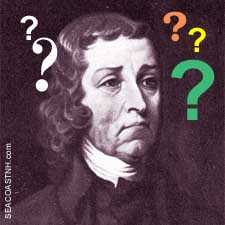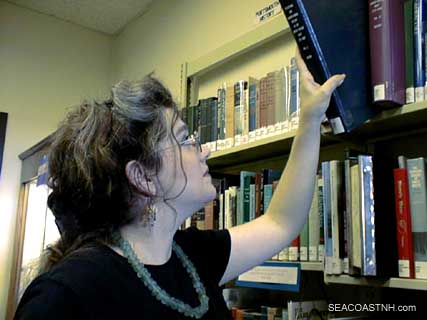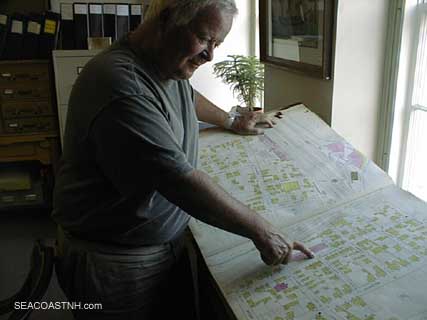|
FRESH STUFF DAILY |
|
|
||
|
|
||
|
|
||
|
SEE ALL SIGNED BOOKS by J. Dennis Robinson click here |
||
Remembering a reader email that sent us into a tailspin. Sometimes the simplest request can lead to bottomless research. Something as simple as a street name may not be simple at all.
SEE Bartlett and other NH FRAMERS It looked, at first glance, just like another email, but it was a rabbit hole. So like Alice, I innocently poked in my head -- and fell and fell and fell. The email came a few years back from Rich Collins, who reads my history web site. Seems he recently bought an 1820-era house on Bartlett Street in Portsmouth and wanted to know something about the Bartlett for whom the street is named. No-brainer. I guessed the origin was Josiah Bartlett. That name is familiar to many who watched the former TV blockbuster "West Wing" in which actor Martin Sheen played fictional President Josiah Bartlett, a former New Hampshire governor. Unfortunately Sheen could never pronounce Concord, NH (he called it con-CORD, like the jet). The show was the greatest boost to that family name since the Bartlett pear. The fictional TV Bartlett was reportedly descended from the real Josiah Bartlett of Kingston, NH. Bartlett was a doctor and one of three NH signers of the Declaration of Independence with Matthew Thornton and William Whipple. There are also Whipple and Thornton streets in Portsmouth, further indicating the likely origin of the street name. But there are other contenders for the street name. There have been Bartletts in Portsmouth since at least 1693 when John and Abraham Bartlett show up on the seating plan of the first Portsmouth Meeting House. They must have been important because they sat in the front pew area not far from the minister, and not in the men's gallery at the back. If they were influential enough, the street might be named after an ancient Bartlett family farm. Ick, more research! Anyone who has done a history term paper knows it can take longer to track down one footnote than to write half the report. Street naming is political. There were street naming committees back in the olden days that continue into the present. A few years back there was political flap over whether a road near Pic N' Pay would be called Brewery Street or be named after former mayor Eileen Foley. The mayor lost that round to the beer lobby. CONTINUE WITH STREET ARTICLE
So we must factor another name into the possible street derivation. Ichabod Bartlett was an early Portsmouth lawyer and NH congressman with plenty of political clout. He was a member of just about every man’s social club in town and helped found the Portsmouth Athenaeum. Then there was NH Governor John Henry Bartlett who taught school for four years in Portsmouth. There used to be a Bartlett School on School Street, which is now a parking lot. Governor Bartlett wrote a history of New Hampshire and authored a series of popular tales of local characters called "Folks is Folks." Could Bartlett Street be named for him? Help! I was spinning deeper into the rabbit hole, so I called for backup. Nicole Luongo Cloutier runs the History Room at the Portsmouth Public Library. There is no simple, central document, Nicole told me back then, that explains WHY Portsmouth streets got their names. Nicole’s instinct was to check the old city directories to learn when Bartlett Street was named. These are handy tools for historians. The first city directory was written by Wybird Penhallow in 1821. (There is a Wybird Street and a Penhallow Street in Portsmouth - wonder why?) A city directory is a sort of phone book before phone numbers existed. It lists streets and every business on the street by number. It lists the people in town and their occupations. By 1834 we see ads creeping in, slowly filling the pages of city directories, in a time long long before Verizon sales representatives. The ads can be as revealing as the statistics. Nicole discovered that there was a Barlett Street listed in 1864, then no Bartlett Street listed for years, then a new permanent listing starting in 1877. Drat, two Bartlett Streets. The only good news was that we could eliminate John H. Bartlett as a contender. He was too young and didn't become governor until 1901 long after the street was named. Local historians, in my view, have a weak track record for truth. We find bits and pieces, make assumptions, but we're looking at the tip of a mighty big iceberg. As with doctors, lawyers, economists and other fortune tellers, the trick is to act like you know more than you do. Toss a few facts around, then run for cover. Nicole checked the public library's archival boxes containing Portsmouth city annual reports. Those start around 1840. She checked the vertical file under "Bartlett" and 'Streets" and I rummaged through some great old articles. According to the Portsmouth Journal from 1839, for example, the city officially changed the names of about 20 major streets in one whack. It must have been terribly disorienting for the old timers. The Parade was changed to Market Square, Fore Street became Market, Ark became Penhallow, Partridge became Water (later changed to Marcy), Court became Pleasant and Pitt became Court. To make matters worse, in a tradition inherited from big cities in England, Portsmouth streets often got new names as the colonial population moved further to the outskirts of town. Daniel Street, for instance, becomes Congress (formerly King Street) when it hits Market Square, and then turns itself into Islington Street at the former library. Every Portsmouth historian from Charles Brewster and Thomas Bailey Aldrich to Bruce Ingmire and Ray Brighton have written about the street-naming chaos. Toss in the fact that many downtown streets are now one-way. And don't forget that many of the streets were renumbered back at the turn of the century. Yikes. Following the rabbit hole, I found myself in the Portsmouth Athenaeum, the city's private library that opened in 1817 across from the North Church steeple. I'm one of 300-something "proprietors" there and nobody thinks it strange when a member suddenly blurts out an obscure question. So I did. "Anyone know whom Bartlett Street is named after?" There was a bustle of activity in response. Ronan Donohoe, a history teacher and former Athenaeum president, loves these puzzles. We looked at a series of 19th century Portsmouth street maps for clues. An 1813 map shows Bartlett near what is now Rock Street. Then it disappears and reappears around the Civil War, running now from Cushing Street to Newington Road. Then it vanishes again. Today Bartlett branches off Islington at the sharp curve by the railroad bridge. It's a key route to the traffic circle from downtown. It was once lined with beautiful elms before they all died of disease in the late 1800s, leaving the street naked and urban-looking. Until around 1876, Bartlett Street was named Creek Street. The "crick" was a popular spot in colonial days for women to wash clothes. As the Italian immigrants moved in at the turn of the 20th century, old Portsmouth legend says, the Irish moved "up the Crick" to live. Then Ronan had a thought. (I call him Ronan the Librarian after Conan the Barbarian for his Schwartnegger-like power when it comes to researching.) He reminded me that the Athenaeum has a file on each of its past proprietors. Among them are many Bartletts. Ugh, more Bartletts. We looked up Ichabod Bartlett, who died in 1853. Ichabod was still a contender until Ronan dealt him a weighty blow. "Doesn't it make sense that the second Bartlett Street had something to do with the centenary of 1876? With all that patriotic fervor for 1776, somebody must have noticed that Josiah Bartlett's street had gone missing." CONTINUE WITH STREET ARTICLE
Circumstantial evidence, to be sure, but the case for Josiah Bartlett was growing strong, and I was running out of time. The rabbit hole next led me to Strawbery Banke Museum. As if changing the streets isn't confusing enough, at Strawbery Banke, they move entire houses to different locations. In a brick building near the end of Court (formerly Pitt) Street was a little-known research room used largely by museum staff. At this writing the little library is being scrutinized. Some of it may move into the new Carter Center currently being constructed. Exactly where all the materials will end up is still uncertain. A few years back the former librarian gave me an introductory tour of the Thayer-Cumings Library Archive. Like the Athenaeum, there was a photo file there of Portsmouth houses arranged by street. The librarian and I reviewed the city maps, photos and directories again, but nothing we found supported or deflated the Josiah Bartlett theory. Next stop, the Whaley library at St. John's Lodge. Many of the Bartlett's were Masons and this is a superb research site for Masonic history, but drat, the library was closed. It’s only open one day a week by appointment. With a deadline looming, I called David Goodman, a researcher then working on a list of all historic records owned by the City of Portsmouth. The list with Goodman's report runs to 400 pages and should eventually be part of the city's online resources. These are not the original manuscripts, mind you, just a gigantic list of about 5,880 documents that exist and where to find them. David suggested that -- if I really wanted the answer to my question -- I should go down to City Hall and comb through the minutes of the mayor and Board of Alderman and the notes from the Common Council of the city from 1876 to 1877. (Insert yawn here.) There might be a statement on the record there indicating exactly which Bartlett was being honored with his own street. But ... maybe not. Once I located an exact date of the meeting, David said, I could possibly track down a report in one of the newspapers of the period. That sounded like hours on the old microfiche machine back at the public library, spooling through projected images of old newspapers. Sorry, gentle reader, I leave that superhuman work for braver researchers. I was about to throw in the towel when someone said, "Hey, do you know about Nancy Grossman's book?" Nancy was then working on a book about the origin of every street in Portsmouth! She offered a few street-naming anecdotes from her research. She favors the story about a nice guy, a poet and a philanthropist in the 19th century who planted elms along a Portsmouth roadside. Then he went off to war and got himself killed. Richards Avenue is named in his honor. "But what about Bartlett Street?" I whined. My time in the rabbit hole was up. I could see the White Rabbit with his giant pocket watch waving at me from the opening. "I haven't gotten to that one yet," Nancy said. Double-drat. But not to despair Rich Collins of Bartlett Street. Nancy’s book eventually came out, published by Back Channel Press, a company she owns with her husband and book-designer John Grossman. According to Placenames of Portsmouth, Bartlett Street was formerly Cambridge Street. Okay. Nancy suggests, in print, that the street was "most probably named for" President Josiah Bartlett. Huzzah! I had come out of the rabbit hole exactly where I went in, and boy were my arms and legs tired from all that digging. But I will dig no more. Nancy Grossman’s book tracks the derivation of 466 Portsmouth street names. Whatever she says about any street in town goes double for me. Copyright © 2007 by J. Dennis Robinson. All rights reserved. Please visit these SeacoastNH.com ad partners.
News about Portsmouth from Fosters.com |
| Thursday, April 18, 2024 |


|
Copyright ® 1996-2020 SeacoastNH.com. All rights reserved. Privacy Statement
Site maintained by ad-cetera graphics

 HISTORY
HISTORY





















